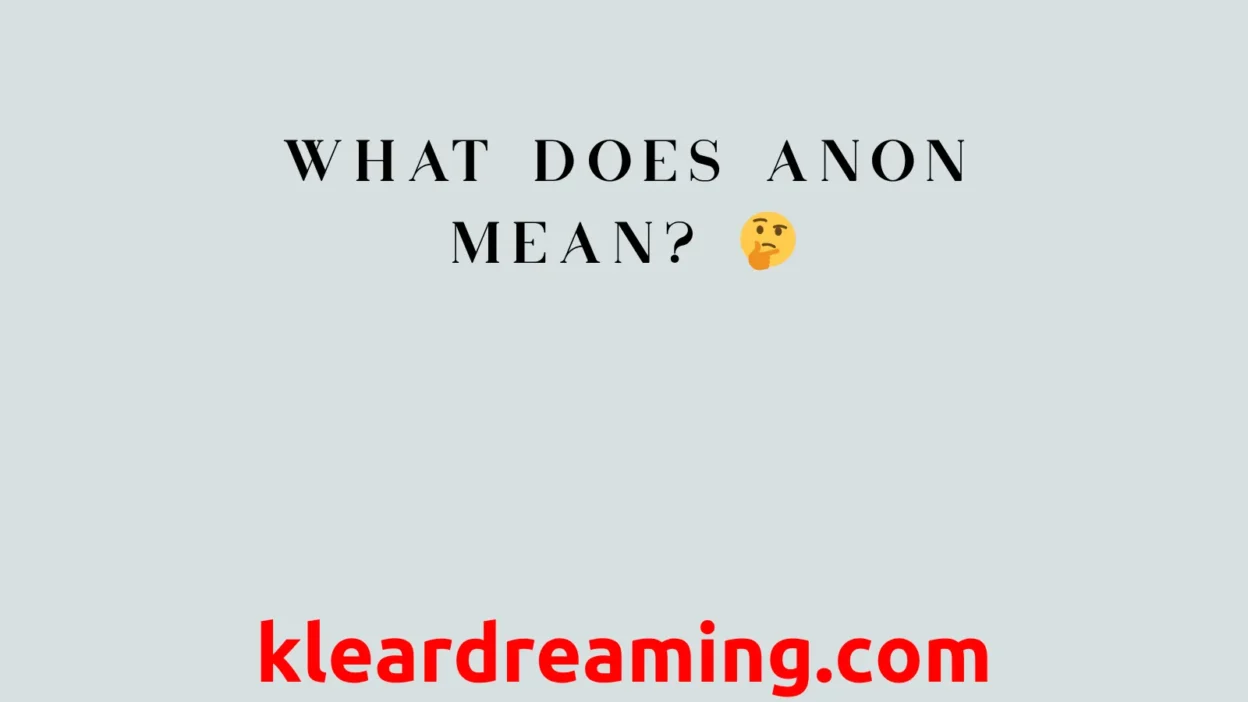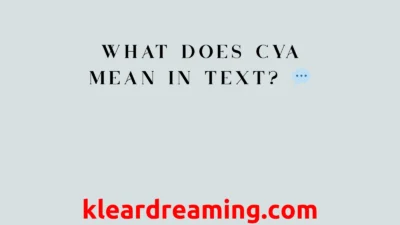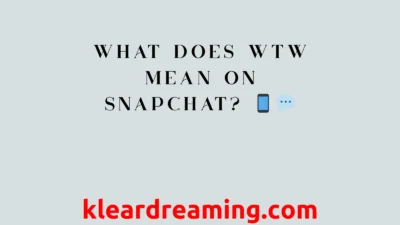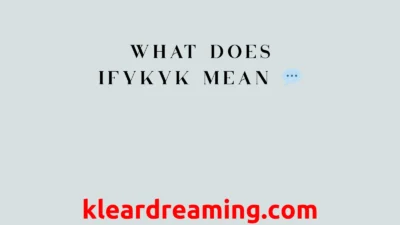You’re scrolling through TikTok or Snapchat, minding your own business, when suddenly you see a comment like: “sent anon 😳” or “reply anon if you want”. For a moment, you pause. What does “anon” even mean? Is it a person, a secret code, or some new slang trend you missed?
If this has ever happened to you, don’t worry—you’re not alone. Slang online evolves faster than most of us can keep up with, and “anon” is one of those terms that pops up everywhere: social media platforms, messaging apps, forums, and even Discord servers. It’s mysterious, casual, and sometimes flirty, depending on the context.
Quick Answer: “Anon” means “anonymous.” It’s a casual way to say that someone is keeping their identity private or posting without revealing their name. The tone can range from neutral to playful or secretive, depending on the conversation.
🧠 What Does Anon Mean in Text?
Anon is simply short for “anonymous.” It refers to someone who chooses not to reveal their identity when posting, messaging, or participating in conversations online.
People use it to:
- Post questions, comments, or confessions without showing their name
- Ask personal or sensitive questions without fear of judgment
- Maintain privacy on social media
- Be playful or mysterious in casual conversations
Example Sentences:
- “Can I ask something anon? It’s kinda personal.”
- “That comment came in anon, so we don’t know who it’s from.”
In short:
anon = anonymous = someone who wants to stay unnamed or private.
📱 Where Is “Anon” Commonly Used?
“Anon” is everywhere online, especially where privacy or anonymous interaction is normal.
Popular Platforms & Usage:
- Snapchat: NGL question stickers and anonymous message apps make “anon” common. Users can send or receive messages without revealing their identity.
- Instagram: Stories with Q&A features often allow “anon” submissions for questions, dares, or confessions.
- TikTok: Users post anonymous challenges, confessions, or comments, often saying “reply anon” for privacy.
- Reddit: Classic use—users frequently post anonymously or under usernames that hide their real identity.
- Tumblr: Anons sending “asks” to bloggers are a long-standing tradition.
- Discord: Anonymous bots or confession servers allow “anon” messages.
- Gaming chats: Some servers allow users to post “anon” if they want to avoid attention.
- Forums: Traditional message boards where “anon” is a standard for privacy.
📝 Tone:
- Casual and playful
- Social-media-friendly
- Neutral in conversation
- ❌ Not suitable for formal or professional settings
💬 Examples of “Anon” in Conversation
Here are 12 realistic texting examples showing different contexts for “anon”:
1. Casual Friend Chat
A: i have something to ask but it’s kinda personal
B: you can send it anon if you want 👍
2. Funny / Playful
A: someone sent you anon lol
B: ooo what did they say 👀
3. Flirty / Secretive
A: got an anon confession about you 😏
B: omg tell me 😭
4. Confessional / Serious
A: i need to vent, can i do it anon?
B: yeah, go ahead. it’s safe
5. Social Media Submission
A: i posted an anon Q&A box on my story
B: bet imma ask anon 👀
6. Gaming Chat
A: someone left anon feedback on your build
B: oh nice, glad they liked it
7. Anonymous Advice
A: any tips for exams?
B: sent anon, check it out
8. Mystery / Drama
A: the comment was anon so we don’t know who wrote it
B: makes sense, that’s why it was so honest lol
9. Shy / Hesitant
A: can i ask a foolish question?
B: sure, anon works too
10. Group Chat Fun
A: anon dropped a meme in the chat
B: hahaha, classic
11. Confession App
A: posted anon confession, fingers crossed
B: same, hoping for some reactions 😅
12. Anonymous Critique
A: got anon review on my project
B: interesting, hope it’s helpful
🕓 When to Use and When Not to Use “Anon”
✅ When to Use
- When you want to protect privacy
- Asking sensitive or personal questions
- Using anonymous Q&A apps or features
- Keeping things casual in group chats
- Adding a playful or mysterious tone
❌ When Not to Use
- In professional emails
- Talking to teachers, managers, or clients
- Serious situations where clarity is needed
- Offline conversations where it can be confusing
- When anonymity is unnecessary or misleading
🔍 Comparison Table
| Context | Example Phrase | Why It Works / Doesn’t |
|---|---|---|
| Friend Chat | “You can reply anon if you want 😄” | Casual, friendly, no pressure |
| Social Media | “Send your questions anon!” | Fits online trends, playful |
| Work Chat | “Please submit feedback anon.” | ❌ Too informal, unprofessional |
| “Responses may be submitted anonymously.” | Clear, formal, acceptable | |
| School / Professional | “All answers will remain anonymous.” | Accurate and neutral |
| Discord / Gaming | “Anon confession bot is live” | Perfect for casual, private online interactions |
🔄 Similar Slang Words or Alternatives
| Slang | Meaning | When to Use |
|---|---|---|
| idk who | Unknown person | Casual chat when sender is unclear |
| random | Stranger / unfamiliar person | Casual online conversations |
| lurker | Reads but doesn’t speak | Forums, Discord, Reddit |
| ghost | Avoids replying or disappears | Messaging, social media |
| NGL | “Not gonna lie” but often used with anon questions | Snapchat & Instagram stories |
| incognito | Hidden / private | Slightly formal or playful online |
| confession | Anonymous sharing of thoughts | Social media apps |
| anon ask | A question sent without revealing identity | Tumblr, IG, Snapchat |
❓ FAQs About “Anon”
1. Does “anon” always mean anonymous?
Yes. It’s short for “anonymous” and is used to hide someone’s identity online.
2. Is “anon” flirty?
Not inherently, but in anonymous crush messages or playful confessions, it can feel flirty or mysterious.
3. Can “anon” be rude?
No. It’s neutral. Misuse can feel suspicious, but the word itself is not offensive.
4. Does “anon” mean “another one”?
No. That’s a different slang meaning and not related to anonymous posts.
5. Why do people use anon messages on Snapchat or Instagram?
They’re shy, embarrassed, or want honest answers without revealing their identity.
6. Can “anon” be used in work emails?
Only in formal phrasing like “Responses may be submitted anonymously.” Direct slang like “anon” is not professional.
7. Is “anon” common in real-life conversation?
Rarely. Mostly online, where anonymity is easier to maintain.
8. Can “anon” be used for jokes or memes?
Yes! Anonymous memes, prank messages, and playful confessions are popular uses.
9. Does “anon” have regional differences?
No major differences. It’s widely recognized online globally, especially in English-speaking social media communities.
10. Are there apps specifically for anon messaging?
Yes. Apps like NGL, Sarahah (historically), and some Q&A Instagram/TikTok features allow anon messages.
Conclusion
“Anon” is a simple, versatile slang term that has become a staple of online conversations. It allows people to share, ask, and reply without revealing their identity, making interactions playful, safe, and sometimes mysterious. Whether you’re responding to an anon message on Snapchat, posting an anon confession on Reddit, or just chatting casually with friends, knowing the meaning and context of “anon” can help you communicate confidently.
Next time you see someone say “anon,” you’ll know exactly what it means: anonymous, casual, and socially safe. Just remember—it’s perfect for online privacy, playful mystery, and casual interactions, but not for professional or urgent conversations.



